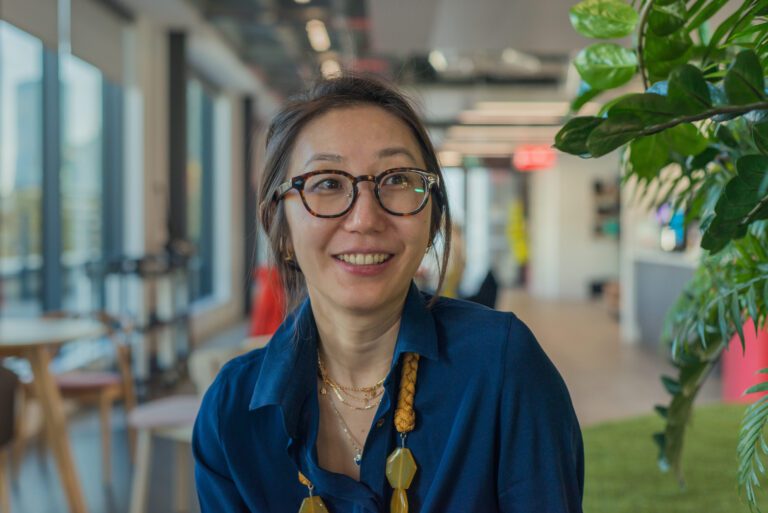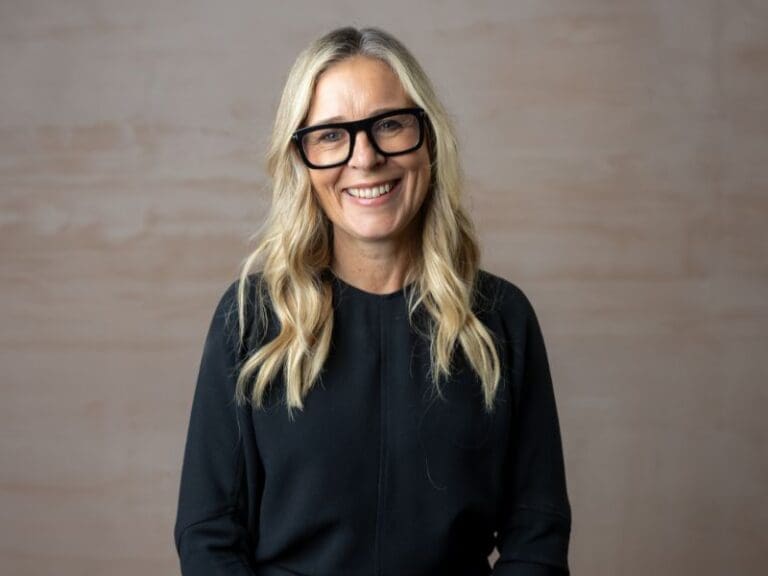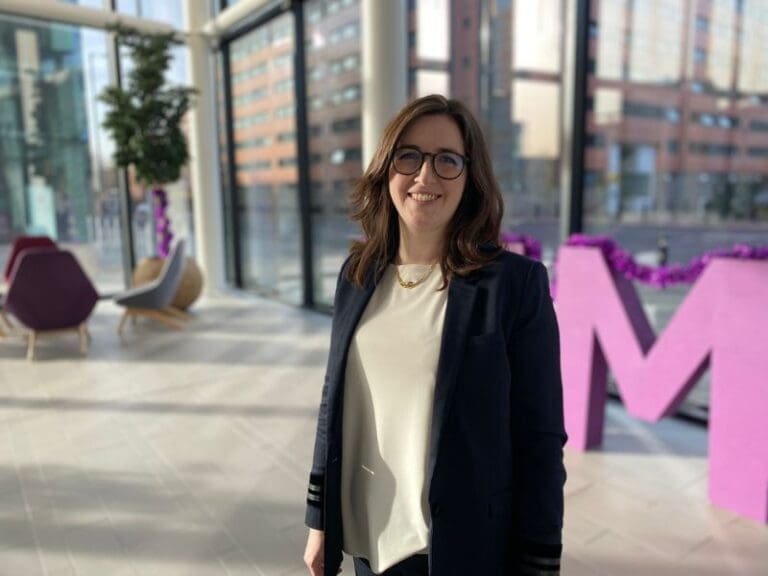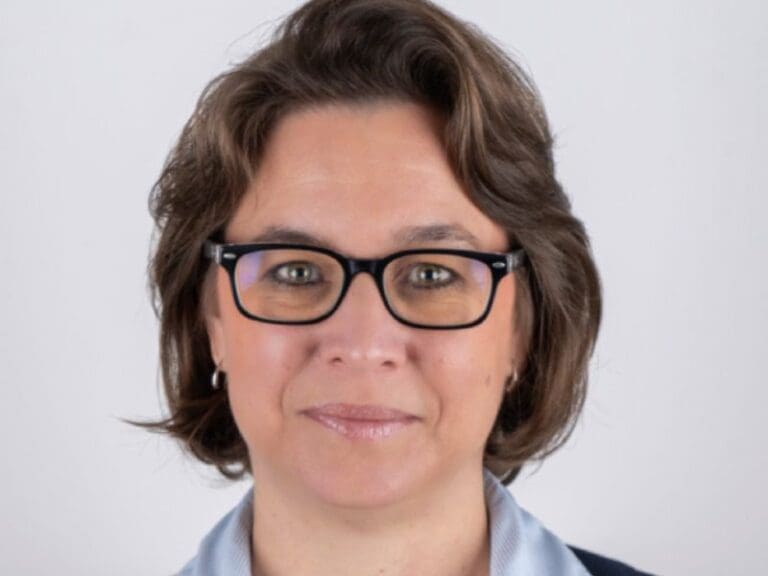Angie Ma is the co-founder of Faculty, a company that enhances organisational performance through safe, impactful, and human-first AI.
Ma founded Faculty with Marc Warner and Andy Brookes in 2014. The London-based firm began as a fellowship to help STEM PhD and master’s graduates transition from academia to a career in data science. Her professional journey has taken an unconventional path – doing research in physics, studying law and founding another tech start-up in the early 2000s. Passionate about science, technology and education, she invests in and mentors start-ups in these areas and advises charities. She also serves as a trustee for the UK’s leading ovarian cancer charity.
How did you land your current role? Was it planned? / What are the key roles in your field of work, and why did you choose your current expertise?
I found my love for AI when I was studying for my PhD in Physics at University College London. It was a great time for AI back then – I happened to be studying at UCL at the same time as the DeepMind founders – so I was constantly learning new things and was able to be quite curious. For more on inspiring leaders in the tech industry, check out Spotlight Series: Neha Sampat, CEO, Contentstack.
This led me to understand the need for AI safety. It was from this that Faculty was founded, alongside my co-founders Marc Warner and Andrew Brookes, with a mission to help businesses implement safe, human-led, and connected AI. Founding a business wasn’t always my plan but after my experience at UCL and meeting Marc and Andrew, it was a natural step for us.
It was more serendipity than meticulous planning. During my PhD at UCL back in 2006/7, I was introduced to AI thanks to the DeepMind founders. We were part of a humanist community looking at existential risk for humanity and we were particularly interested in AI safety.
This exposure to AI safety, a niche field until recent years, both sparked my fascination with AI and made me realise that it would be the transformative technology of our time. By the end of 2013, I was ready to move on from academia. When my co-founder, Marc, told me he was inspired by a programme in the US where they help academics transition into becoming commercial data scientists, I proposed we do something similar in the UK and that’s how we started Faculty.
Entrepreneurship runs in my family. My father is a successful entrepreneur and he started his business when I was around ten. Growing up, I witnessed his journey starting the company from scratch and it ingrained in me the spirit of starting and running a business. To be honest, I don’t know what the alternative would be like!
Prior to Faculty, I also tried my hand at Young Enterprise in Sixth form and founding a start-up right after my undergrad, although it failed. These experiences, combined with my upbringing, made the concept of launching a start-up less daunting and more of an exciting opportunity to bring ideas to life.
Did you (or do you) have a role model in tech or business in general?
While there are many exceptional people whom I look up to and learn from, like Charlie Munger and Ray Dalio, the most significant influence in my life has been my grandma. During my formative years, she instilled in me profound values and a resilient attitude toward life.
In her time, the 1930s Chinese societal norms heavily restricted girls’ access to education. My grandma defied expectations and overcame enormous hardships, like being cut off from her family and financial support during the Sino-Japanese war. Nevertheless, she completed her studies and became one of the first women in China to attend university and study law.
Her resilience in overcoming such adversity throughout her life profoundly impacted me. From her, I learned the importance of striving for excellence regardless of circumstances and the importance of resisting a victim mindset, no matter how challenging the environment. Her journey and strength have been a continuous source of inspiration and motivation for me.
What are you most proud of in your career, so far?
Founding a business and seeing it succeed.
Starting Faculty was definitely the hardest thing I’ve ever done in my career, but it’s also my greatest achievement. It took a lot of work and determination, especially in the beginning, but once we started to gain new clients, employ more colleagues, and see we were making a change to businesses’ AI procedures, it was the best feeling.”
I’m incredibly proud of the impactful work we have done at Faculty over the past decade. We have delivered some of the most important applied AI technology, nationally and internationally, such as being the first to introduce President Biden to deepfakes and being the reason Prime Minister Theresa May made technology companies take down propaganda within two hours.
We have been credited with saving thousands of lives during COVID through our work with the NHS. For me, AI isn’t just about cool, cutting-edge technology; it is about empowering frontline workers, like the NHS medical staff, with powerful tools that enhance their work and make a difference in the world.
Are there any specific skills or traits that you notice companies look for when you’re searching for roles in your field?
I think the main traits that people who want to pursue a career in technology, or AI in particular, should have are curiosity and an eagerness to learn. The industry is evolving quickly and there are always new updates, news and approaches to take into account. No one can know it all, but having that drive to learn more will set you apart from others.
Additionally, investing time into learning more about the industry will set you up for a successful career further down the line by helping you truly understand if it’s right for you and whether or not you’re passionate about it.
In the fast-paced tech industry, particularly in AI, developments occur almost daily. Beyond the obvious need for curiosity and the ability to learn quickly, companies increasingly value human-centric skills and strong people skills. There are two main reasons for this. Firstly, tech roles often involve significant collaboration with colleagues and customers. Effective communication, the ability to understand and listen to others well are essential for delivering impactful work. Secondly, AI systems have to be human-first and trusted by users. Hence those working in the field need to be able to empathise with users, understand human-centric processes, and appreciate user-focused design. These skills are crucial for creating AI that genuinely meet users’ needs and positively impacts society.
Has anyone ever tried to stop you from learning and developing in your professional life, or have you found the tech sector supportive?
I’ve been extremely lucky to have a supportive network around me at all times. I have my two co-founders and we all work together to push each other as well as provide support.
Outside of Faculty, I’m also part of a founder’s group that gets together regularly. Being a founder is a unique career and this group has given me a space to meet like-minded people who have similar concerns. We help each other work through problems, discuss recent successes and use the meetings as a time to springboard ideas off each other.
I do recognise though that not all women have had the same experiences as me. The technology industry is thankfully changing, but there’s still a lot to do to ensure women feel supported, no matter where they are in their career journey.
The most significant challenge I hear from people when it comes to learning and development is a lack of time. It is true that working in tech can be demanding. Whilst some skills, like coding certifications may require formal courses, I’ve found that most skills are developed through practical application, doing the work itself, and continuous iteration.
The key is taking ownership of your learning and being intentional about it. For instance, I recognise that improving my communication skills would enhance my effectiveness in doing my role. So, in every task, whether it is writing messages or emails to customers or colleagues, I focus on phrasing my words carefully and considering how others will perceive what I say. I apply the same diligence to preparing for meetings. I find books and videos that offer tips on effective communication. There is a wealth of amazing resources available online, where experts generously share their tips and experiences.
Entering the world of work can be daunting. Do you have any words of advice for anyone feeling overwhelmed?
Take it one step at a time. Starting a career can be nerve-wracking, but everyone that you’re working with will have started somewhere.
Don’t be afraid to ask questions or talk to someone if you need more support too. Most companies will have an HR team or a learning and development function that can help you to grow and ease any concerns.
Remember, the company has hired you for a reason. Don’t let imposter syndrome get in the way of your achievements.
Starting a career can be nerve-wracking. I vividly recall the uncertainty I felt in my early 20s, unsure of my direction, worried about making mistakes, and fearing I’d make the wrong choices.
Now in my mid-40s, here’s what I would tell my younger self.
What advice would you give other women wanting to reach their career goals in technology?
Find a supportive group of people that will be there to both celebrate and commiserate with you. Work can be stressful and being surrounded by people that want the best for you will help you to focus and reach your career goals.
I’d also recommend finding a mentorship scheme. This could be through your workplace or an external source. Mentoring is great to help discuss your aspirations, set targets and gain invaluable experience from someone you look up to.
In reflecting on my career journey, I have identified two self-limiting beliefs that have held me back and how overcoming them has shaped my path.
First, I often tried to meet external expectations, particularly those of my traditional Chinese family and culture. Studying Physics or doing start-ups was unconventional and met with resistance. Over time, I learned that aligning my career choices with my personal values and strengths was far more important than adhering to others’ expectations. Understanding myself and what I care about enabled me to make decisions that were right for me rather than conforming to external pressures.
Second, I previously viewed my challenges through the lens of being a woman, which created a victim mindset. For instance, in Faculty’s early days, I struggled with securing investor interest and attributed it to gender bias. However, I later realised that my difficulties were due to a lack of experience in pitching and selling. By framing these challenges as skills to be developed rather than inherent flaws, I empowered myself to improve and succeed.








